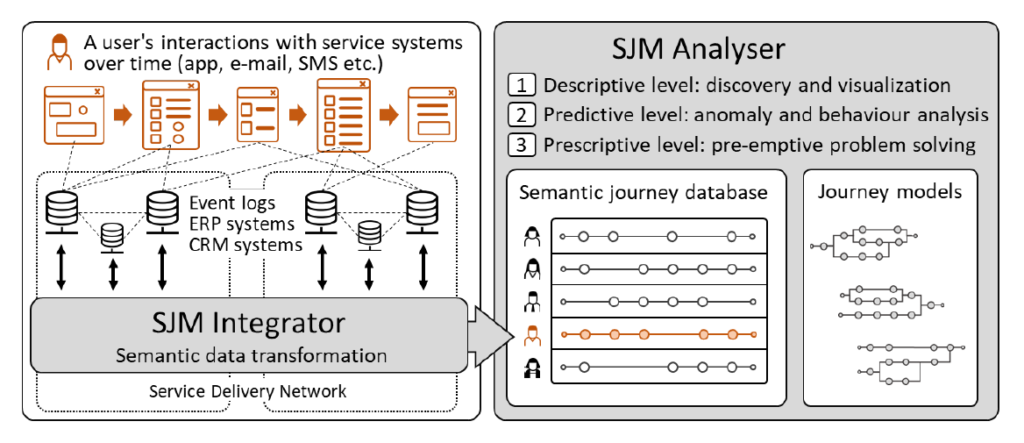Context
This project is defined in the scope of the Smart Journey Mining project [1, 9]. The SJM project vision is to increase the quality of services by uniting research on customer journeys and process mining using new developments in logic-based analysis and artificial intelligence. Research in SJM is done together with SINTEF Digital (Norway), University of Oslo (Norway), and Eindhoven University of Technology (The Netherlands).

Although digital services are supposed to simplify our lives and increase our efficiency, they often frustrate and burden customers, users, and employees. In the SJM project trace data left from users in various systems during repeated interactions with a service over time, on the level of individuals is used.
As illustrated on the left side of the project overview sketch, this data needs to be transformed such that it can be connected to a user journey on a suitable level of granularity or abstraction (SJM Integrator) before it can be used for analysis on descriptive, predictive, or prescriptive level (SJM Analyser).
Problem
Many events recorded by service systems are at the level of API calls, website clicks, tickets received etc. and not at the level of user journey concepts. Thus, there is a need for method that facilitate to connect events collected at different levels of granularity to high-level concepts in the user journey domain. The figure below gives an example of such relation between low-level recorded events and high level activities or in the user journey context touchpoints. The role of granularity, methods for even abstraction, and case correlation have been subject to research in process mining. Event abstraction was recently surveyed in [4] summarizing various unsupervised and supervised methods.

In Smart Journey Mining, we represent user journeys using the CJML notation and standard [2, 3]. CJML is an easy-to-use modelling language that offers a terminology, syntax, diagrams, and methods. It distinguishes between the planned journey (as intended) and the actual journey (what happened for an individual user). Event abstraction and mapping of low-level events to user journeys has been researched [7, 8]; however, there are no event abstraction method tailored towards CJML.
Proposed contribution
The challenge of this Master project is to extend existing event abstraction methods (e.g., [5, 6]) and/or case correlation [8] methods that have only been applied to generic business processes, to the domain of user journeys and evaluate their suitability for this purpose. The possible contributions in the Master project include: a conceptualization of the event abstraction problem for user journeys and connected to CJML, adaptations of existing supervised event abstraction methods to CJML (implementation in Java or Python), and a critical evaluation of their suitability in user journeys withing the CJML framework.
Contact
Felix Mannhardt, f.mannhardt@tue.nl
